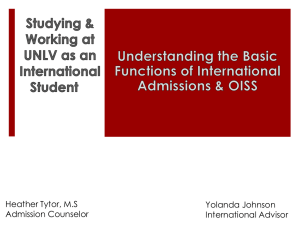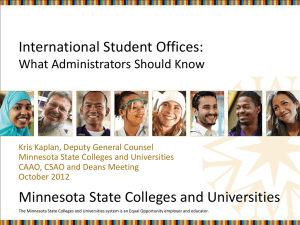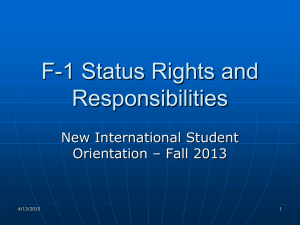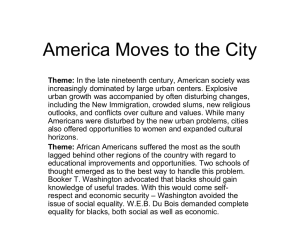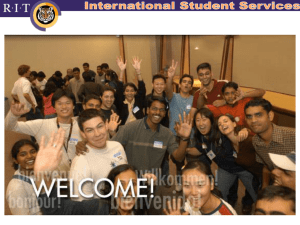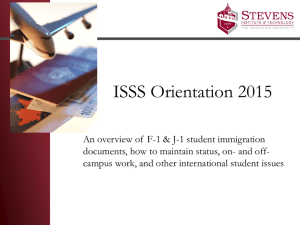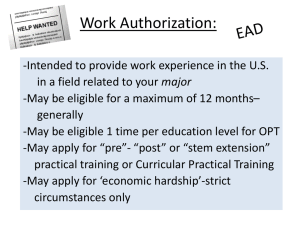International Student Orientation
advertisement
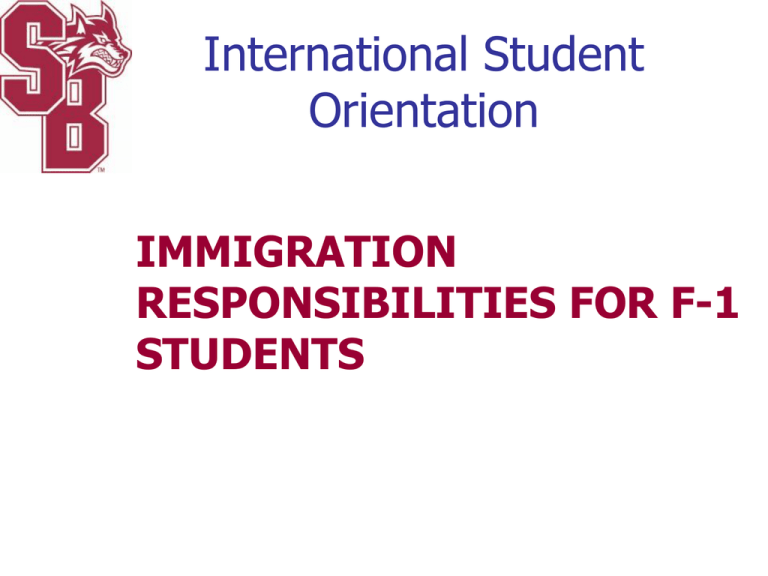
International Student Orientation IMMIGRATION RESPONSIBILITIES FOR F-1 STUDENTS Stony Brook Visa and Immigration Services Located on the 5th floor of the Melville Library, Room E5310 Walk-in advising hours: Mon.– Fri. 9:30 to 4:30 Tel: (631) 632-INTL (631-632-4685) Fax: (631) 632-7064 Email: internationalservices@notes.cc.sunysb.edu Website: http://www.stonybrook.edu/iaps/international/ Visa and Immigration Services Staff Elizabeth Barnum, Assistant Dean for International Programs and Services, Director of Visa and Immigration Services Nancy Lannak, Adviser to International Faculty and Scholars Elsy Arieta-Padro, Adviser to International Faculty and Scholars Chris Kalesis, International Student Adviser Gretchen Gosnell, International Student Adviser Erin Keffeler, International Student Adviser Jasmina Gradistanac, International Student Adviser Christine Greenberg, Staff Assistant Patty Poster, Secretary Basics to Understand F-1 students’ main purpose for being in the US is to be a student. It is your responsibility to maintain your legal status while in the United States. Immigration regulations may change. Keep in touch. Important Immigration Documentation SEVIS Form I-20 PASSPORT VISA Form I-94 (small white card stapled into your passport) PASSPORT Your passport is your government’s proof of citizenship. You must keep this valid at all times. Immigration specifically says 6 months into the future. You need to contact your own embassy or consulate for renewal--we can provide information on how to contact them. Keep it safe! If lost or stolen, report it to the police and to your embassy immediately. When you extend your passport, provide a copy to your International Student Adviser right away. VISA – sample copy VISA Stamped inside passport at a US Consulate or Embassy outside of the US Allows for travel into the US to undergo inspection by an immigration officer for admission to the US in F-1 status Must be valid on day of entry into US The visa stamp is not a relevant document once you have been admitted into the US and are granted F-1 IMMIGRATION STATUS May expire while in the US without affecting your immigration status A valid visa stamp is only required if you are outside of the US and are applying for re-entry to the US I-94 Card – sample copy I-94 Card Form I-94 card gives you immigration status – keep this card secure with your immigration documents When admission is granted by an immigration inspector at Port of Entry: Form I-94 is stamped and “D/S” (“duration of status”) notation is added “Duration of Status” means that you can remain in the U.S. as long as you continue your program of study as noted on Form I-20, provided you maintain full time academic status and immigration status. See an International Student Adviser immediately if there is an expiration date written in by immigration instead of D/S I-94 Card - continued Has an 11-digit admission number SEVIS ID number is recorded on back Form I-94 is collected upon departure from the US New card and number issued on re-entry If lost, currently costs $330 to replace SEVIS Form I-20 (INITIAL) SEVIS I-20 Pg. 3 – sample copy SEVIS Form I-20 Certificate of Eligibility Form I-20 indicates: Page 1 Section 1: Number) Section 2: Section 3: Section 4: Section 5: Section 6: Section 7: Section 8: Your Biographic Information (SEVIS ID Your University’s Information Reason I-20 was Created Level of Education Program/Report and Completion Dates English Proficiency Approximate Annual Expenses Means of Financial Support SEVIS Form I-20 – con’t. Adjudication Stamp: Date and location of arrival into the US Immigration status: F-1 Length of stay: D/S Page 3 Employment Authorizations Reentry Endorsements (Travel Signatures) SEVIS Form I-20 – con’t. Your responsibility to keep your Form I-20 current Retain all Forms I-20 ever issued to you forever! SEVIS Student and Exchange Visitor Information System, (SEVIS), is an internet-based system that collects, maintains, and tracks information on international students and scholars in F-1 and J-1 status. Immigration and Customs Enforcement (ICE) manages SEVIS. ICE is a division of the Department of Homeland Security. US Embassies and other US Govt. Agencies can view this information. SEVIS II is coming in 2012 or 2013. Check our website for updates. What does SEVIS do? Records all Forms I-20 and DS-2019 issued for F students and J exchange visitors and their accompanying dependents. Provides a database of current international student and exchange visitor information. Facilitates university compliance with Homeland Security and Department of State regulations by monitoring and tracking international students and scholars. Maintaining F-1 status As nonimmigrant international students, you must: Maintain full-time enrollment in Fall and Spring semesters Maintain satisfactory academic progress Maintain a valid SEVIS Form I-20 Maintain a valid passport – note the 6 month rule No unauthorized employment File timely applications for extension of program, changes in academic level, graduation, or for post-completion Practical Training Report address changes within 10 days in SOLAR Full-Time Enrollment Graduate Students: G-1 = 12 credits G-2 = 9 credits G-3 = 12 credits G-4 = 9 credits G-5 = 9 credits Undergraduate Students: Full time is 12 credits per semester F-1 students are authorized to take only one online course (up to 3 credits) per semester to count towards their full course of study requirement. Full-Time Enrollment If unable to maintain full-time enrollment, see your International Student Adviser immediately. Do not drop below full-time unless an International Adviser has authorized it in SEVIS. Part-Time Enrollment may be Authorized for: Severe difficulty adjusting to the US educational system/ difficulties with the English language in the first semester Medical need for an underload (detailed documentation from physician required) Student is in his/her last semester and taking the necessary number of credits needed to complete all degree requirements Unacceptable Reasons for Part-Time Enrollment : Poor grades in a prior semester Fear of failing a class Lack of money to pay tuition Not getting a graduate assistantship Completing incomplete classes No classes that you want to take open Failure to Maintain F-1 Status Suspension of all F-1 benefits including employment Termination of your SEVIS record Must file for reinstatement to F-1 status with USCIS – Form I-539/$290 fee within 5 months of violation (USCIS processing times 2 – 6 months) if eligible or Re-apply for F-1 status through travel and reentry. Requires initial Form I-20 with new visa and paying the SEVIS fee and admission to the US in F-1 status. Reporting Address Changes within 10 days Immigration regulations require that all F-1 students to report a change of their local (US) or foreign address within 10 DAYS of moving. Students who live off-campus must update their Local (Off Campus) type address in SOLAR; which we send to SEVIS. This is your “toothbrush” address. Change in foreign address must be reported to Stony Brook Visa and Immigration Services via email, or in person; your advisers will update your new home country address in SEVIS. You are responsible for updating SOLAR It is a violation of your status if you fail to report your address within 10 days Leave of Absence Must have approval by and International Student Adviser Required to leave US immediately (unless medical) Your SEVIS record will be terminated Requires new Form I-20 if you want to return Must be in F-1 status for one year again to be eligible for off-campus employment Program Extension If you cannot graduate by completion date: Application for Extension must be entered into SEVIS before the expiration date of Form I-20 Failure to extend in timely fashion is a violation of status requiring reinstatement Begin process at least 30 days prior to Form I-20 expiration date noted in section 5 Changes in academic program/degree level Notify your International Student Adviser if you are accepted into another academic program/degree level. A new Form I-20 must be issued before the end of your grace period or the start of the next semester, depending on your particular situation. You can lose your F-1 status if you fail to request a new I-20 on time. Dependents If your dependents are here: Their legal status is linked to your status Their expiration date is linked to your date Health Insurance is mandatory for each dependent A travel signature is required for each dependent Children may go to primary and secondary school Those in F-2 immigration status cannot enroll in a university degree program and cannot seek employment If your dependent applies for another nonimmigrant status (F-1, H1-B), please notify your International Student Adviser immediately. Transferring out If you would like to transfer to another university/college you must submit the following documents to International Services: Transfer out form Transfer report from the other institution Photocopy of your admission letter, I-94 card (front and back) and passport Receipt from Student Accounts showing that your bill has been paid in full Departure Form F-1: Employment Any employment authorization is a benefit of your F-1 status. You must first be certain that you have maintained your F-1 status before you can be eligible for any type of work Instructions and information on how to obtain employment authorization are on the Stony Brook Visa and Immigration Services website Employment Options On-Campus employment Off-Campus employment Curricular Practical Training (CPT) Optional Practical Training (OPT) Severe economic hardship Internship with an International Organization Visit the Stony Brook Visa and Immigration Services website for the dates and times of our CPT and OPT workshops. On-campus Employment What is considered on-campus employment? Working for the University and/or Research Foundation Working for outside companies who are providing student services on campus (such as Dining Services) It does not include any local businesses offcampus! If you transfer to another school you are no longer authorized to work at Stony Brook. You may not work during “grace period” following degree completion On-campus Employment Employment is limited to 20 hours per week while school is in session – accumulated total of all jobs. Each TA, GA, & RA position has a defined number of hours (10 - 20 hours per week) Hours for Residence Hall Assistants is defined 20 hours per week Full-time (21 hours or more per week) during school vacations- summer/winter break. Work on campus does not need to be degree related. No formal authorization is required Social Security Once you have a job offer, you need to apply for a Social Security Number (SSN) from the Social Security Administration (SSA) The purpose of a Social Security Number is to help the government keep track of an individual’s earnings for tax purposes Regulations require you must have valid employment offer to apply for a SSN I have a job offer! What’s next? Register for a full courseload (for most students this will be 12 credits) Stony Brook Visa and Immigration Services will run Registration, a big computer-based task that verifies your arrival (Intake Interview) and full-time registration with SEVIS. It can take approximately 10 days after this “run” for an extract of your SEVIS data to be available for viewing by Social Security. Applying for SSN Your on-campus employer must issue you a letter of offer that clearly outlines your terms of employment. Academic departments have been given a template for this purpose. Other campus employers can contact our office to request this template. When the letter is prepared and signed, it must be brought to Stony Brook Visa and Immigration Services for endorsement. Applying for SSN To apply for a Social Security Number Visit one of the SSA offices to fill out an application. The nearest offices are in Patchogue and Hauppauge Use a stable address that is not expected to change in the next three months. Present: The endorsed job offer letter and Original immigration documents. Passport, Form I94, Form I-20. Bring copies of your immigration documents with you, to give SS for their records. Important Note: Be sure to work for the employer whose letter of offer was used to apply for the Social Security Number. Federal authorities are taking action against students who apply for the SSN and do not work. More SSN information: Once the SSA has accepted your application, most cards will be issued in 10 days to 3 weeks. Your SSN is very private information, and is only intended to be used for employment and taxation purposes. Many agencies will ask for an SSN, but will issue an alternate identification number if you object to sharing this private information. An SSN can be misused by people who steal or reshape your information to commit frauds and incur debts. If you are a victim of identity theft, it is very difficult to repair the damage to your reputation and credit history. If your Social Security card is lost or stolen it will be difficult to replace. Memorize your Social Security Number and then leave it at home in a safe place! I have no job offer yet, but everyone’s asking for my SSN Because the SSN is the most common “official” federal identification in the US, many agencies will ask for it first – not even considering that some people do not have it. Many agencies, including the Department of Motor Vehicles, request an SSN but will accept a letter from the SSA that explains that you are not eligible for the SSN. The SSA can usually issue a denial letter while you wait. Individual Taxpayer Identification Numbers (ITIN) Are issued by the Internal Revenue Service (IRS), our federal taxation agency Are issued to people who need to provide the federal government with an identification number for tax purposes, and are not eligible for an SSN Are generally applied for at tax filing time, but may be issued at other times under some circumstances. If you later become eligible for an SSN, you will use the SSN instead of the ITIN. More about Social Security Numbers… You do not need a SSN to: Open a bank account Rent an apartment Open an utility account (gas electricity, etc) Set up a cell phone account Conduct business correspondences Income Tax form filing required EVERY YEAR File income tax returns must be filed each year whether or not you have earned income in the US (April 15) File Form 8843 if you have no US Earned income File Form 1040NR if you have US earned income Some F-1 students and scholars qualify for a tax treaty exception but must file to claim the tax treaty exemption International Student Advisers are not trained to do tax advising. Detailed information can be found on the irs.gov website. There is a link on our website. Travel Signature A travel signature given by an International Student Adviser on Form I-20 is valid for one year. For those on OPT, travel signatures are only valid for six months. Travel Signature requests must be made at least 2 weeks in advance of travel Graduate Students bring: Recent letter of good standing from your department Passport I-94 card (front and back) Form I-20 (must be the original and most recent version) Undergraduate Students bring: Enrollment Verification form from the Registrar Passport I-94 card (front and back) Form I-20 (must be the original and most recent version) Travel: Port-of-Entry Inspection Port-of-entry inspection after travel outside of the US: Passport valid at least 6 months into the future. Unexpired F-1/F-2 visa. Valid SEVIS Form I-20 with travel signature endorsed on page 3. Proof of full-time enrollment: Enrollment verification from registrar or transcript verifying enrollment in a full time course of study, or letter of good standing from Graduate department. Proof of financial support SPECIAL REGISTRATION Students from certain countries who are subject to NSEERS must register with immigration at a designated international airport every time they leave the United States. If you are registered in NSEERS, you will have a “FIN” number written in your passport and/or on your I-94 See ice.gov for more information Traveling to Mexico, Canada or Caribbean and Re-entering the U.S. with “Automatic Visa Re-Validation” Visiting for less than 30 days may not need a valid U.S. visa, just travel signature endorsed on I-20, I94 card and valid passport.* Do not surrender your I-94 card if your visa has expired. Mexican, Canadian or Caribbean country visas may be required. Check with their Consulate/Embassy. * Does not apply to nationals of all countries Special Note: If you apply for an F-1 visa in Canada, Mexico or a Caribbean country “Automatic Visa Revalidation” does not apply. If your visa application is denied, you will not be allowed to re-enter the US. Applying for a Visa Visas are only issued outside the US If you need to renew your visa it is best to apply in your home country Security checks made by the US government may delay visa processing For further information, check the website of the US consulate where you plan to apply Please Remember to: Make a separate copy of all of your immigration and identification documents (front and back) and keep them in a separate and safe place Retain any Forms I-20/DS-2019 ever issued to you forever Be aware of all deadlines and submit paperwork at least two weeks ahead of time Keep your address updated in SOLAR YOUR RIGHTS IN THE UNITED STATES Criminal activity can impact your ability to enter the U.S. or remain in the U.S. Even an arrest without a conviction can cause you immigration problems If arrested, you will need a criminal defense lawyer who is also familiar with immigration law. You may need to hire an immigration attorney to work with your criminal defense lawyer 52 When do arrest issues come up? arrest routine traffic stop visa interview entering the United States change of status applying for an immigration benefit, such as OPT immigration hearing 53 You have the Right to Remain Silent . . . You can refuse to answer questions from the police until you can speak with your lawyer You can assert your right to remain silent at any time, even if you have already answered some questions 54 Exceptions to the Right to Remain Silent You have to identify yourself if asked by law enforcement Name and address Nonimmigrants (F-1 and J-1) may be required to show their immigration documents (passport, I-94 card, Form I-20 or DS-2019) If you are stopped in your car, you must show your driver’s license, registration, and proof of insurance when asked 55 You have the Right to an Attorney . . . Attorney = Lawyer If you are arrested, say that you want to speak to a lawyer In criminal matters, you can request a public defender if you cannot afford to pay for your own lawyer Make sure you are speaking with your lawyer Memorize your lawyer’s name and phone number Request a translator in court 56 How can I find a lawyer? Contact International Services for advice on how to select an immigration attorney. If you are detained, ask to speak with someone from your embassy or consulate. They may be able to assist you in finding legal counsel. Finding the Right Immigration Lawyer article: http://www.visalaw.com/hal.html ABA’s clickable map of state & local Bar Associations http://www.abanet.org/barserv/stlobar.html Be prepared to pay a consultation fee, and ask about other costs during your initial meeting with a lawyer. Even a “pro bono” (free) case may involve filing and court fees. 57 Other useful websites for finding an attorney Suffolk County Bar Association http://www.scba.org/ Martindale-Hubbell/Lawyers.com http://www.lawyers.com/ American Immigration Lawyers Association http://www.ailalawyer.com/ U.S. Dept. of Justice EOIR Legal Orientation and Pro Bono Program List of Free Legal Services http://www.usdoj.gov/eoir/probono/states.htm CUNY Immigration Centers http://web.cuny.edu/about/citizenship/aboutus/centers.html 58 For More Information: Ask your International Student Adviser American Civil Liberties Union publication “Know Your Rights” is available online: http://www.aclu.org/workplacerights/gen/133 81res20020312.html (in English, Spanish, Arabic, Urdu, Hindi, Punjabi, Farsi, Somali) 59 Questions ?????

